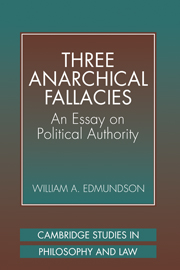Book contents
- Frontmatter
- Contents
- Acknowledgments
- Introduction
- Part One The Fallacious Argument from the Failure of Political Obligation
- Part Two The “Law Is Coercive” Fallacy
- Part Three The Inner Sphere of Privacy Fallacy
- 7 The Private Sphere
- 8 The Moral and the Social
- 9 The Social and the Political
- Conclusion: The State for What?
- Index
9 - The Social and the Political
from Part Three - The Inner Sphere of Privacy Fallacy
Published online by Cambridge University Press: 19 March 2010
- Frontmatter
- Contents
- Acknowledgments
- Introduction
- Part One The Fallacious Argument from the Failure of Political Obligation
- Part Two The “Law Is Coercive” Fallacy
- Part Three The Inner Sphere of Privacy Fallacy
- 7 The Private Sphere
- 8 The Moral and the Social
- 9 The Social and the Political
- Conclusion: The State for What?
- Index
Summary
Are there moral requirements whose permissible means of enforcement are not available to the state? Some things that are morally required of an actor are such that it is morally permissible for properly situated others to compel her compliance. The law is shaped by a recognition that in some instances what would otherwise be a battery, or worse, is justifiable by the fact that the would-be defendant acted to enforce a moral requirement, for example, the moral requirement that the would-be complainant refrain from violating the defendant's moral right to bodily integrity or property. This is sometimes explained by reference to what would be permissible in a state of nature. However we regard the matter, there are, as far as I can see, no instances of privately compellable moral requirements that are not permissibly legally enforceable. Here is a possible example: Suppose that all children are morally required to obey their parents' reasonable\ bedtime rules, and suppose that the parents may physically compel the child's compliance. It could be argued that this requirement is strongly delegalized because legal intervention would violate moral principles that protect the integrity of the family.
This example would be worrisome if it presented a genuine example of a moral requirement, but I don't think it does. Children are relatively deficient in knowledge and judgment. This is why their parents are entitled to make special rules for them until they are of “suitable age and discretion.” But this very same immaturity makes it odd to say that children are morally required to follow these rules; a child does not breach a duty or ignore a moral obligation when it ignores them.
- Type
- Chapter
- Information
- Three Anarchical FallaciesAn Essay on Political Authority, pp. 155 - 178Publisher: Cambridge University PressPrint publication year: 1998



